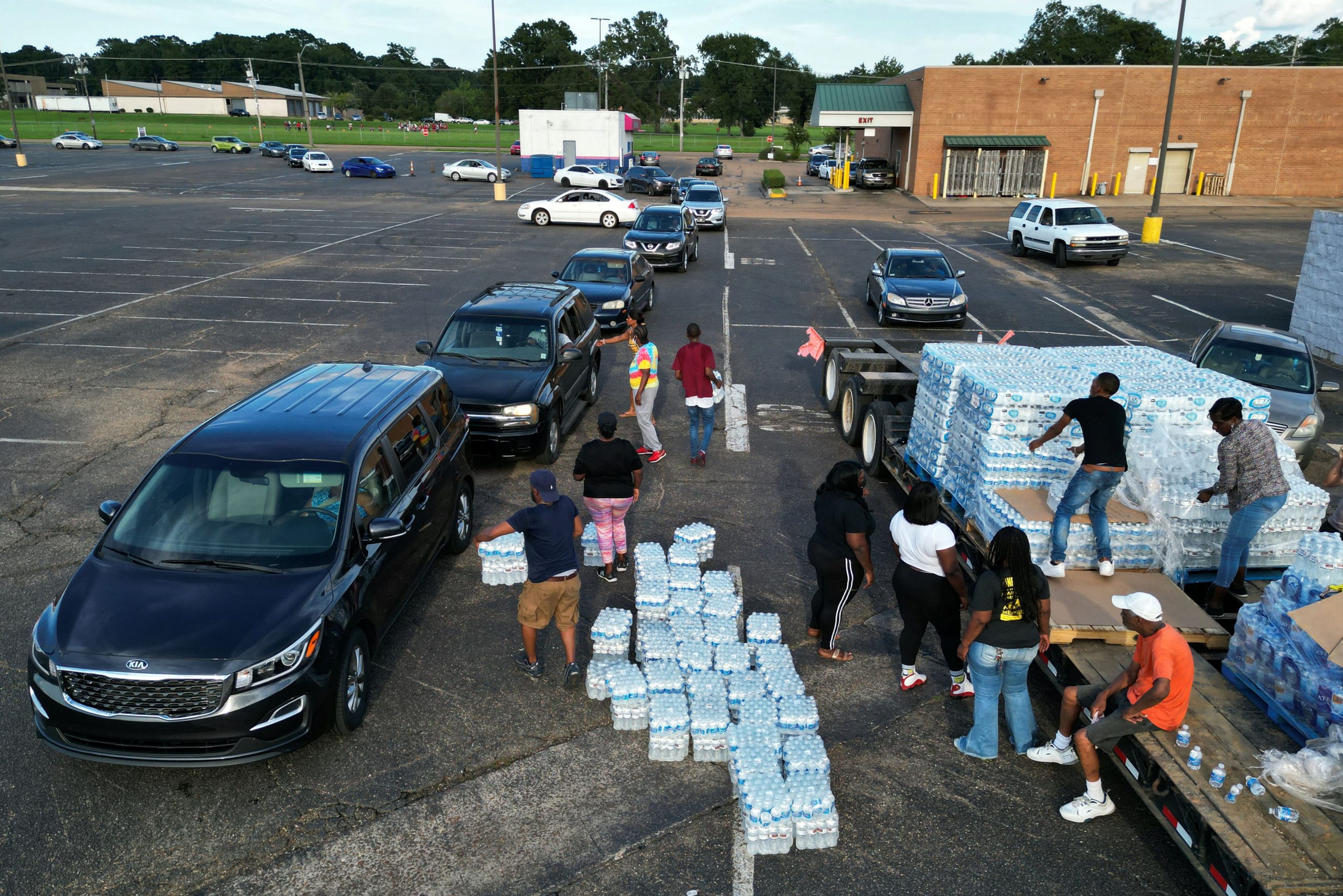
Lauren C. Moye, FISM News
[elfsight_social_share_buttons id=”1″]
Republican Mississippi Governor Tate Reeves and Democratic Jackson Mayor Chokwe Lumumba held a joint press conference yesterday for the first time to address the continuing water crisis in the state’s capital city, which became a federally declared emergency on Tuesday.
Jackson’s water system, fragile and struggling for decades, came to a head on Monday when flooding of the Pearl River overwhelmed the main treatment facility. The city system lost pressure in 43,000 connections, leading to a city-wide boil water advisory. Some residents reported sewage coming through faucets instead of water.
Despite the emergency situation, Reeves and Lumumba have avoided a joint appearance so far. This comes as no surprise, as the Democratic city officials and Republican state leaders often play the blame game when it comes to the city’s widespread infrastructure problems.
“I’ve heard you know, the characterization that there are dueling press conferences between myself and the governor,” Lumumba said late Wednesday. “That’s not how I would characterize it. What we’re trying to do is present ourselves early and often.”
On Monday, Jackson’s main treatment plant, O.B. Curtis, cut production due to a change in water chemistry caused by the Pearl River flooding. The higher-water level added extra sediments and organic materials that increased the turbidity, or cloudiness, of the water. Operators had to change the treatment process to compensate.
The governor and mayor said production can increase as river water levels decrease. Jackson also acquired a rental pump from Florida to help increase production. This was installed at the O.B. Curtis Plant on Wednesday.
The emergency rental pump has been installed today at Jackson's O.B. Curtis water treatment plant. This is the first step of many and we will continue to work with our partners until the job is done. For more information go to https://t.co/qFPsHqad8k pic.twitter.com/u58WxU6DHr
— msema (@MSEMA) August 31, 2022
The optimal pressure for the city of Jackson is 87 pounds per square inch. On Wednesday, the city was at 80psi before dropping to 40psi later in the day, according to Lumumba.
Multiple water distribution sites have been set up throughout the city to provide clean bottled water for drinking and bulk non-potable water for other purposes. However, the mayor reported that the water was safe for bathing in.
Despite the positive steps toward resolving the emergency water pressure, the problems causing it have been building for years, and the city doesn’t have the money to fix them.
“I am angry about this water crisis because this don’t make no sense. We had no water for two months almost,” said one angry Jackson citizen to local news station WLBT3.
A search through a public Jackson, Mississippi Facebook group shows that citizens have frequently posted about water giveaways and new shipments of water at local stores for weeks.
The city has been under a separate boil advisory notice issued by the Mississippi State Department of Health since July 29 for the 430,000 surface-water connections, according to a separate WLBT3 report.
Problems go back much further than that.
In 2013, the city commissioned studies that found it needed to make $300 million in repairs and upgrades to the water system by 2033 and an additional $400 million worth of fixes to the sewage system over the same time span.
“Problems keep recurring, though, with shutdowns, ‘boil-water’ or ‘don’t-use’ alerts being issued at unwelcome times throughout the year,” wrote Jackson Advocate’s Brad Franklin about the water system on Dec. 30, 2021.
In his lengthy breakdown of the history of Jackson’s water treatment system, Franklin shared that it’s a long-term problem due to the age of the system, including the cast iron pipes, many of which are more than 100 years old, throughout the city that need to be replaced. However, Jackson does not have the revenue to accomplish this, according to Franklin.
For Fiscal Year 2020-2021, the city allocated nearly half ($58.86 million) of its entire yearly budget of $123.34 million to the water and sewage systems.
Franklin points fingers at gubernatorial politicians for not helping fund the needed updates to the water system, which he feels stems from racial motivations. Racial tensions are certainly nothing new to the city, which has seen a mass exodus of white citizens to the suburbs for decades. U.S. Census data shows that Jackson’s population is 80% black or African-American.
Governor Reeves has previously implied that the city’s system, which is the responsibility of the city government, is in disarray due to poor operations and being understaffed for years.
Deanne Criswell, the Federal Emergency Management Agency administrator, will visit Jackson today.
We are working with state & local officials in Jackson, Mississippi to support those impacted by the water crisis. @fema_deanne is traveling there tomorrow to ensure they have everything they need to restore the water quality. https://t.co/xCgP7qyGnG pic.twitter.com/1vawAJIC2m
— FEMA (@fema) September 1, 2022
